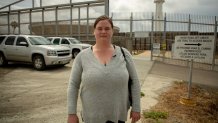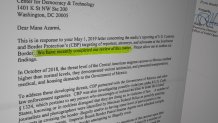A fourth deadline has come and gone for the Department of Homeland Security (DHS) to provide detailed information about a secret surveillance program tied to the Central American caravans that traveled to the U.S-Mexico border.
U.S. Customs and Border Protection (CBP) has provided limited information about the extent of the surveillance effort, and journalists, attorneys and other private citizens on the government’s target list are still dealing with the adverse consequences of having alerts placed on their passports and in some cases, being denied entry into Mexico.
Earlier this month, U.S. Senators Kamala Harris (D-CA), Richard Blumenthal (D-CT), Tom Udall (D-NM), and Elizabeth Warren (D-MA) sent a letter to the DHS’ Acting Secretary Kevin McAleenan, requesting detailed information about the database by May 24. NBC 7 asked those offices if DHS had responded by the deadline but have not heard back.
That letter focused on the creation of database used by border agents to track and store information on 59 individuals -- including journalists, attorneys, and immigration advocates -- who followed a migrant caravan that arrived in Tijuana, Baja California late last year. Most of the targets of that surveillance efforts are U.S. citizens.
This most recent congressional demand for information is the fourth time lawmakers have sought more details about the surveillance program. Senators Blumenthal and Jeff Merkley (D-OR), along with the House Committee on Homeland Security, sent their first request for information on March 7, 2019.
NBC 7 Investigates revealed the existence of that database March 6, after obtaining screenshots of the database and other information from a Homeland Security source. NBC 7 Investigates also obtained a copy of a U.S. government dossier on immigration attorney Nicole Ramos of Al Otro Lado, a legal aid organization that helps migrants, refugees, and deportees in Tijuana.
One of Ramos’ colleagues, Nora Phillips, was also listed in the database and has been denied entry into Mexico since an alert was placed on her passport.

“It was pretty terrifying.”
Local
On a foggy Saturday morning, Phillips walked nearly two miles to Friendship Park, a half-acre binational park in the San Diego-Tijuana area. It was the only want she could hold a business meeting with colleagues in Tijuana.
Friendship Park was inaugurated by First Lady Pat Nixon on August 18, 1971, as a symbol of friendship between the U.S. and Mexico. It is still the only location along the San Diego-Tijuana border that citizens from both countries can see each other and talk through a metal bar barrier, without clearing customs in their respective countries. The Park is open weekends from 10 a.m. to 2 p.m.

Phillips stood on the U.S. side, in Imperial Beach, and spoke to her colleagues, inches away, in Tijuana.
“Having a staff meeting through a border fence because you need to see your staff in person is pretty absurd,” she said.
Phillips said she first suspected something was wrong in January 2019 when she was detained for hours by Mexican immigration officials at the Guadalajara airport. She said her passport had been flagged, forcing her to return to the United States.
“That was one of those traumatic experiences of my entire life and I never want to go through again,” she said.“When I was detained, the governments of both Mexico and the United States denied they had done anything. But we now have proof of what we knew for a long time, that there's been this escalating amount of harassment of our volunteers.”
Phillips and Ramos were not alone. A third Al Otro Lado attorney, Erika Pinheiro, is also listed in the database.

The three attorneys contend that U.S. border agents placed the alerts on their passports to retaliate against and harass “human rights defenders who work with asylum seekers and who are critical of CBP practices.”
“You can't use a passport alert to punish somebody for exercising their First Amendment right to practice their profession,” Phillips said. “Especially when you're denouncing human rights abuses that are resulting in people dying.”
Customs and Border Protection recently disclosed that its internal review of the database and surveillance program had been completed, but offered few details about the inititative.
In a May 9, 2019 letter, Randy Howe, Executive Director of Field Operations for U.S. Customs and Border Protection, said the U.S. had partnered with the Mexican Government to create the database. Howe said the surveillance program is "standard law enforcement practice."

CBP said those named in the database either helped migrants cross the border illegally or participated in violent attacks on agents. The letter said CBP was “investigating possible violations of U.S. Code 1324,” which prohibits the harboring and/or smuggling of illegal immigrants into the country.
But Nora says she never counsels her clients to break any laws.
“I've had clients that have called me and said ‘I'm desperate. I don't know what to do. I'm thinking of crossing over,’” Phillips said. “And I'm like ‘Do not do that. You will die in the desert or I will see you in prison. Do not do that.’”
Phillips runs a deportee program through Al Otro Lado, with a particular focus on people who have been deported from the country straight out of prison.
“It's an incredibly vulnerable population,” Phillips said. “They need all kinds of services: social services, mental health support, legal services. And those programs are basically dead right now because I can’t go [to Mexico.]”
Phillips said the alert placed on her passport has made it nearly impossible for her to do the job she's so passionate about.
“I feel like I can't do my job. There are so many people that need help.”



